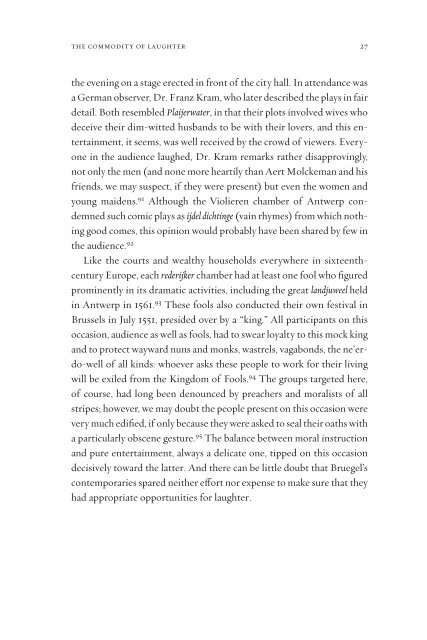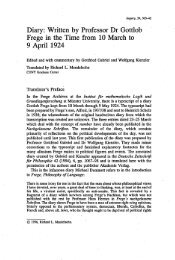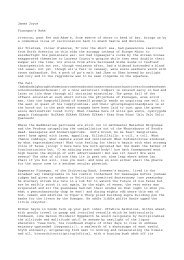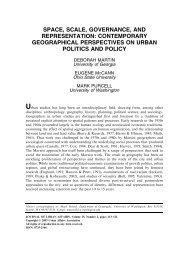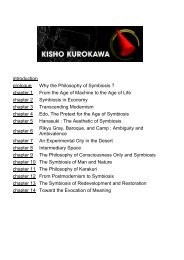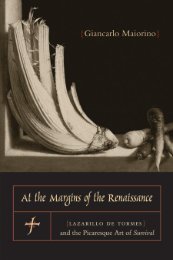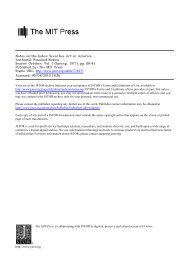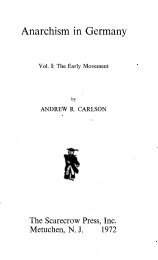Pieter Bruegel and the Art of Laughter - AAAARG.ORG
Pieter Bruegel and the Art of Laughter - AAAARG.ORG
Pieter Bruegel and the Art of Laughter - AAAARG.ORG
Create successful ePaper yourself
Turn your PDF publications into a flip-book with our unique Google optimized e-Paper software.
<strong>the</strong> commodity <strong>of</strong> laughter 27<br />
<strong>the</strong> evening on a stage erected in front <strong>of</strong> <strong>the</strong> city hall. In attendance was<br />
a German observer, Dr. Franz Kram, who later described <strong>the</strong> plays in fair<br />
detail. Both resembled Plaijerwater, in that <strong>the</strong>ir plots involved wives who<br />
deceive <strong>the</strong>ir dim-witted husb<strong>and</strong>s to be with <strong>the</strong>ir lovers, <strong>and</strong> this entertainment,<br />
it seems, was well received by <strong>the</strong> crowd <strong>of</strong> viewers. Everyone<br />
in <strong>the</strong> audience laughed, Dr. Kram remarks ra<strong>the</strong>r disapprovingly,<br />
not only <strong>the</strong> men (<strong>and</strong> none more heartily than Aert Molckeman <strong>and</strong> his<br />
friends, we may suspect, if <strong>the</strong>y were present) but even <strong>the</strong> women <strong>and</strong><br />
young maidens. 91 Although <strong>the</strong> Violieren chamber <strong>of</strong> Antwerp condemned<br />
such comic plays as ijdel dichtinge (vain rhymes) from which nothing<br />
good comes, this opinion would probably have been shared by few in<br />
<strong>the</strong> audience. 92<br />
Like <strong>the</strong> courts <strong>and</strong> wealthy households everywhere in sixteenthcentury<br />
Europe, each rederijker chamber had at least one fool who figured<br />
prominently in its dramatic activities, including <strong>the</strong> great l<strong>and</strong>juweel held<br />
in Antwerp in 1561. 93 These fools also conducted <strong>the</strong>ir own festival in<br />
Brussels in July 1551, presided over by a “king.” All participants on this<br />
occasion, audience as well as fools, had to swear loyalty to this mock king<br />
<strong>and</strong> to protect wayward nuns <strong>and</strong> monks, wastrels, vagabonds, <strong>the</strong> ne’erdo-well<br />
<strong>of</strong> all kinds: whoever asks <strong>the</strong>se people to work for <strong>the</strong>ir living<br />
will be exiled from <strong>the</strong> Kingdom <strong>of</strong> Fools. 94 The groups targeted here,<br />
<strong>of</strong> course, had long been denounced by preachers <strong>and</strong> moralists <strong>of</strong> all<br />
stripes; however, we may doubt <strong>the</strong> people present on this occasion were<br />
very much edified, if only because <strong>the</strong>y were asked to seal <strong>the</strong>ir oaths with<br />
a particularly obscene gesture. 95 The balance between moral instruction<br />
<strong>and</strong> pure entertainment, always a delicate one, tipped on this occasion<br />
decisively toward <strong>the</strong> latter. And <strong>the</strong>re can be little doubt that <strong>Bruegel</strong>’s<br />
contemporaries spared nei<strong>the</strong>r eªort nor expense to make sure that <strong>the</strong>y<br />
had appropriate opportunities for laughter.


